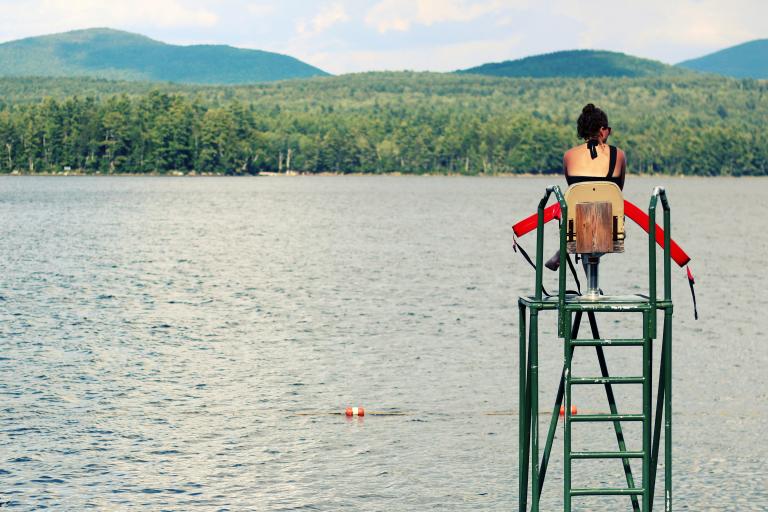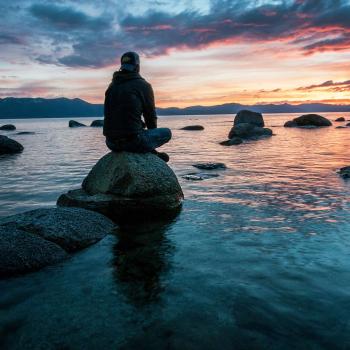I first wrote a story with this title a few years ago, but now it’s time for a new take on it—because if ever there was a need for more lifeguards it is now. There’s a churning rip-current of bad news and negativity out there and it’s taking people down with it. So, it’s time to be on guard for those around us who are slipping beneath the surface. Or, if needed, to rescue ourselves.
Some simple but urgent guidance to get us through these next months.
The words above topped an email I received a few days ago from the spiritual author and Franciscan Friar Richard Rohr. I usually get a weekly email from Rohr, but this week he sent out an emergency, mid-week missive. It was as if Rohr sensed just how troubled our country had become and needed to speak out immediately. He describes our current maelstrom of issues this way:
Every day more and more people are facing the catastrophe of extreme weather. The neurotic news cycle is increasingly driven by a single narcissistic leader whose words and deeds incite hatred, sow discord, and amplify the daily chaos. The pandemic that seems to be returning in waves continues to wreak suffering and disorder with no end in sight, and there is no guarantee of the future in an economy designed to protect the rich and powerful at the expense of the poor and those subsisting at the margins of society.
Rohr speaks the truth about the trouble and strife we face right now and to his list we also might add the systematic racism that seems to be ingrained in our society. It causes the normally mild-mannered Rohr to exclaim, “It’s no wonder the mental and emotional health among a large portion of the American population is in tangible decline!”
For starters, what can you and I do about our own well-being? Here’s step one: As we’ve discussed frequently here, it’s time to use all the tools in our spiritual toolboxes, from prayer to meditation to simply focusing on the breath. (As a friend recently reminded me, “Breath in love, exhale peace.”) Rohr adds another vital idea to the mix:
I recommend for your spiritual practice for the next four months that you impose a moratorium on exactly how much news you are subject to—hopefully not more than an hour a day of television, social media, internet news, magazine and newspaper commentary, and/or political discussions.
Not more than one hour a day. Can you do it? As Rohr points out, all this nonstop news consumption and discussion will only tear you apart. It also pulls you away from what he calls “Divine Truth,” which “is always found in a bigger place.” Rohr suggests that we:
Use this time for some form of public service, volunteerism, mystical reading from the masters, prayer—or, preferably, all of the above. You have much to gain now and nothing to lose. Nothing at all. And the world—with you as a stable center—has nothing to lose. And everything to gain.
Are you okay? It’s time to pull out your whistle and play lifeguard.
Who around you is drowning in a sea of negativity and bad news? Recommend strongly to them that they cut down on their news intake, because it ultimately does no good. Yes, be aware of the issues. Yes, step up when and where you can. But do not let the news monopolize your inner thoughts, especially since there’s nothing we can do to alter our current national direction—except cast your mail-in-ballot at the earliest possible date or vote on November 3rd.
Here’s another idea: Since you may not know the news consumption of those around you, but can sense that something isn’t quite right, you can become what John Templeton refers to as the “minister of your own church.” There’s no religious study needed. Templeton believed that all of the good things you do in this life constitute your own personal ministry. That’s because, for most of us, life is not made up of “great sacrifices or high-level duties” but of small, everyday gestures.
Now is the time to add smiles, kindness and love to your daily activities and encounters. It’s a way to break through the funk. When we do this, we not only bring a small measure of comfort and joy to others, we bring it to ourselves as well. Templeton asks us to consider:
How wide is the path of love you tread? Can it encompass all those around you? Pour out love in thought, in word, and in action. Try to think love, speak love, feel love, and become immersed in it, until all else in your life and world is absorbed and melted into giving love.
My late-friend John Gray was of a similar mind. Writing to me while in his late-80s, he told me he was often perplexed by the rudeness and cruelty of mankind. John would rant about the injustices he saw but also believed strongly in doing his part to make the world a better place. His words bear repeating here:
I believe that God resides in my own being and manifests itself in my acts of kindness, my simple sincerity, trying to respect each person I meet just as they are—prying smiles, tenderness and love out of them; softening their hatreds, their prejudices, their frustrations of the moment. How I do this is simple. I smile and cheer them up! It is my contribution to humanity and it costs nothing. I try to live each day, in spite of the ugliness I see in our world, with friendship and kindness to all I encounter.
If you do decide to become a lifeguard, know this: It’s all about giving, while expecting nothing in return. Which is actually a win-win situation. The author and philosopher Tom Morris points out the delightful conundrum in the giving/receiving dynamic in the passage below—which are words worth contemplating each day.
We are here to attempt to give more to this life than we take from it, a task that if undertaken properly, is impossible. The more we give, the more we get. But that’s the point.
It’s time to (wo)man your lifeguard station. Who can you save?


















